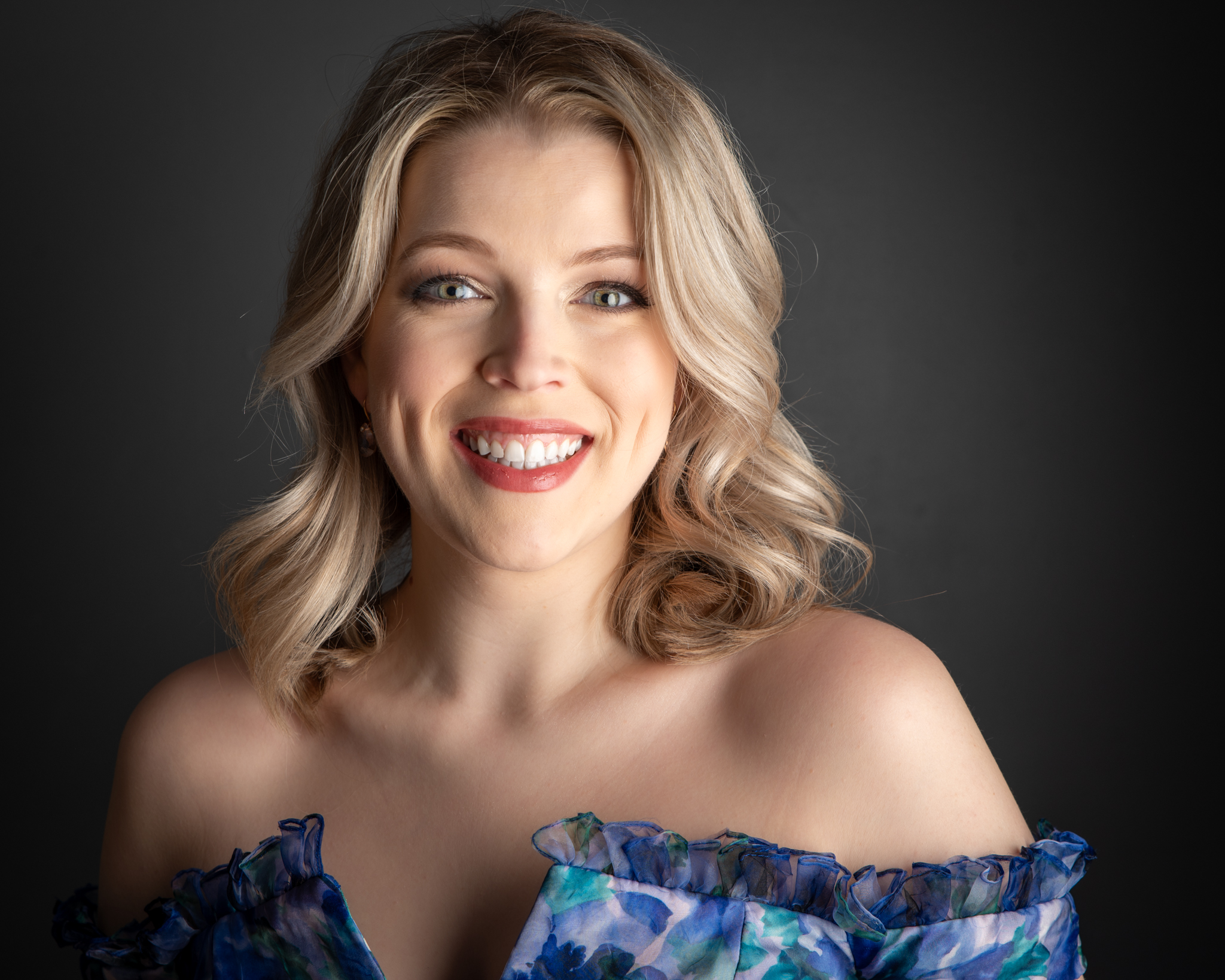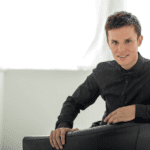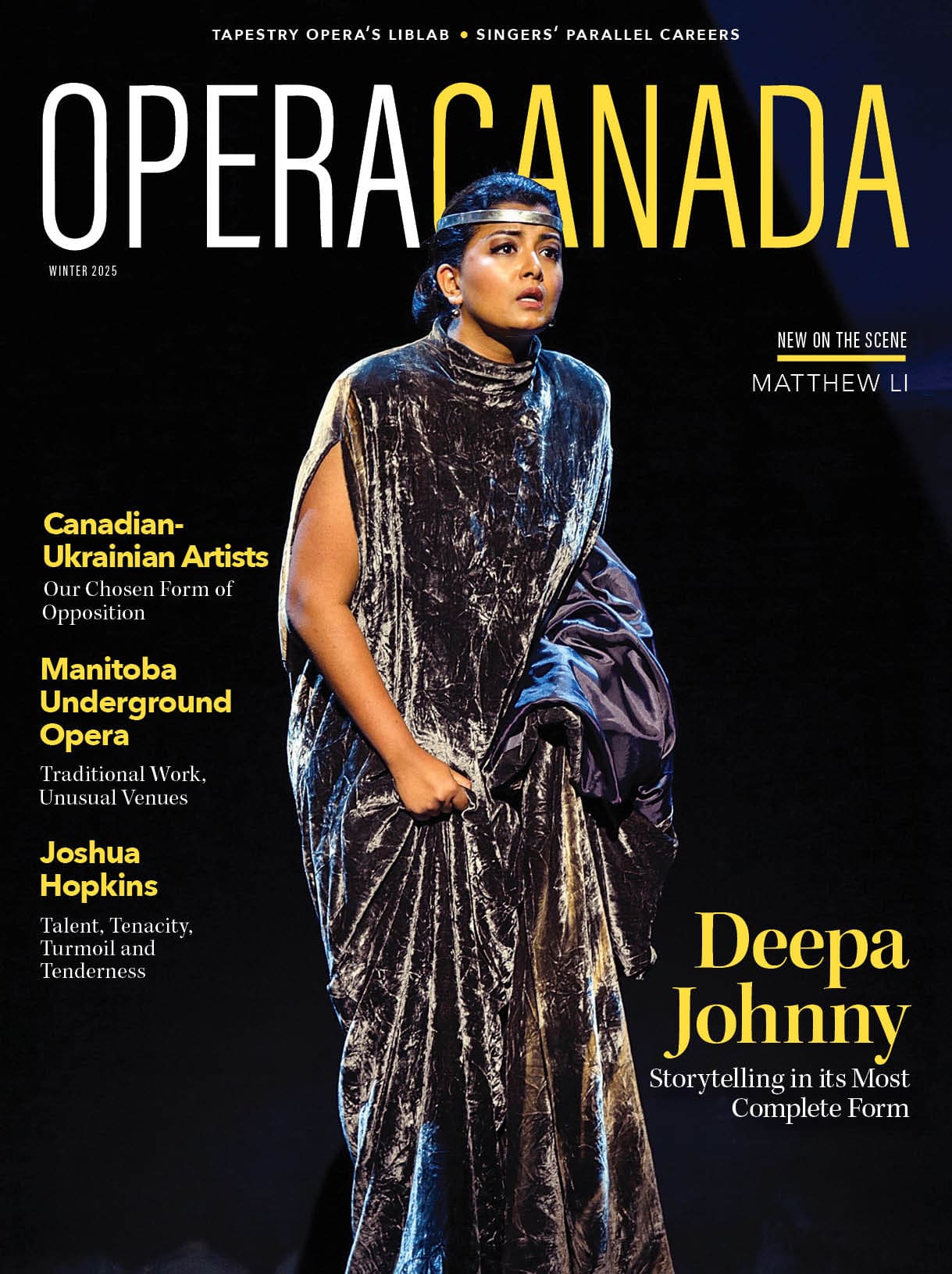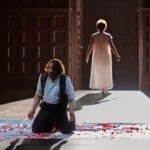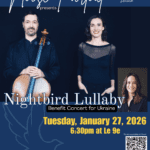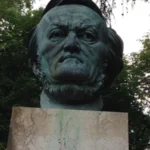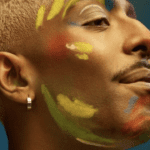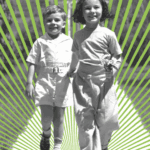The Artist of the Week is Canadian soprano Laura Nielsen. Currently working overseas, Laura is performing the role of Freia in Theater Erfurt‘s upcoming production of Das Rheingold, running March 23 to May 29 (info and tickets here).
Last season, Laura made her Theater Erfurt debut as Kassandra (Tochter von König Priamos) and Ihr Geist in Felix Weingartner’s Orestes. Laura was a 2022 finalist in the Canadian Opera Company’s CentreStage Competition, and semi-finalist in both the 28th Riccardo Zandonai Competition and the Concorso Internazionale Città de Alcamo. Laura is an alumni of the Yale Opera Program, and during her studies performed many roles including Rosalba Montealban in Catán’s Florencia en el Amazonas, Laetitia in Menotti’s The Old Maid and the Thief, the Cook in Stravinsky’s Le Rossignol.
In between rehearsals, Laura shared with us the biggest risk she’s ever taken with a role, how she came from a very musical family, and what opera role she would love to be performing right now. Read on to find out more.
Heels or flats?
Heels for sure… but day to day you can find me in comfortable running shoes or in my Blundstones.
Which opera role do you want to be singing right now?
I would love to be singing Mimi in Puccini’s La bohème!
Who is a singer you admire that is currently working?
There are so many fantastic singers to choose from! Right now, I really admire Ailyn Pérez. I’ve had the good fortune to see her live as Tatyana in Tchaikovsky’s Eugene Onegin, Alice in Verdi’s Falstaff and most recently saw her Met: Live in HD performance in the title role of Daniel Catan’s Florencia en el Amazonas. She has incredible vocal control and lights up the stage. She’s amazing.
What’s your favourite orchestral instrument? Why?
I grew up playing the cello and loved playing in our school orchestras when I was younger. Whenever I hear an aria with good cello lines, I’m hooked!
Which role do you wish you could sing, but is not your voice type?
I know I look like a Christine or a Carlotta… but who doesn’t want to sing Phantom in The Phantom of the Opera?!
What’s your favourite movie?
The Grand Budapest Hotel. It is visually stunning and the story is beautifully narrated.
What’s the best meal you’ve ever had?
Two summers ago, I visited my family in Denmark for the first time in over ten years. I hadn’t visited since I was a teenager and my great aunt Doris made all of the traditional
Danish favourites. My entire extended family came to spend time together and share an amazing meal.
What’s your favourite classical group/orchestra?
I love André Rieu and his Johann Strauss Orchestra. In addition to being amazing musicians, they share classical music in a way that welcomes everyone: they’re always
in on the joke and don’t take themselves too seriously. I would love to see them in person one day!
What’s the biggest risk you’ve taken for a production?
Last summer, I was asked to step in to sing Mimi in Puccini’s La Bohème with two weeks’ notice. I knew a decent portion of her music from concerts but it was a push to get the role together in such a short period of time. I felt safe enough to take this risk because of the support I received from the team at COSA Canada. Our production went really well and I am thankful that the next time I sing Mimi, I will be ready!
Does your process change from role to role?
Yes and no. The ingredients that I use to learn a role stay the same, but their measurements change depending on the nature, scope and size of the role. Their measurements can also change if I have performed the role before or if the piece is new to me. The toolkit I use to learn roles includes: reading the source material (a libretto, a book, a play…etc), translating the score, finding IPA resources, speaking the text rhythmically, listening to recordings, watching the opera in person or on video, coaching with a pianist or teacher, rehearsing with other musicians…etc. I also like knowing some general world history of when the piece was written and political influences of that time period. Last season, I played the oracle Kassandra in the modern premiere of Felix Weingartner’s opera, Orestes at Theater Erfurt. Since the last performance of the show was in Leipzig in 1902, there were limited resources available to study this work. I had to be a little more creative when working on the role: I relied more on my coach to understand the tonal landscape of the score and focused some of my listening to repertoire that influenced Weingartner’s opera (Strauss and Wagner were notable influences in the piece). I also listened to his symphonies and orchestral works to imagine how the overall opera might sound. Contrastingly, this season I am preparing the role of Freia in Wagner’s Das Rheingold.
Given that a wealth of resources are available about Wagnerian repertoire, my process can shift slightly. The role is still challenging but I have different ways in which I can
prepare for our upcoming shows because it is in the traditional operatic repertoire.
Do you enjoy cooking? If yes, what is your best dish?
I love cooking! I make a very good pasta carbonara if I do say so myself.
Which TV show did you binge-watch last?
I just finished the latest season of Rick and Morty and I have been loving The Bear.
Where did you go to school?
I did my Bachelor of Music and Artist Diploma in Voice Performance at the University of Western Ontario and my Master of Music in Opera Performance at Yale University in Connecticut.
What is the best thing about being an opera artist?
I love the beautiful music, the passionate stories and the many ways we get to tell them. I’m not going to lie… opera singing is also a great secret-weapon at a party!
What’s the most important lesson you’ve learned from childhood?
You can’t control everything! Of course, I can control being prepared, being punctual, having a positive attitude, being kind to others…etc but the rest is out of my hands. Surrendering that power to the universe, so to speak, is very liberating.
Are there more musicians in your family? Who and what do they play/sing?
Growing up in my family felt like the Von Trapps from The Sound of Music. We were always making music in one way or another: my mother is a singer and my father sings
and plays the guitar. My sister, who was always the dancer in the family, also has a beautiful singing voice. When I showed an aptitude for music, I already had an amazing
support system to help guide me. I am very grateful that music is something that we still connect over and share as a family.
The industry is tough, and filled with rejection. How do you cope? Does it get easier?
I don’t know if there is a single artist working today who hasn’t heard the word “no” in their career. Some of the best redirections of my life have happened because things didn’t go “according to plan”. I don’t know to what extent it gets easier, but maybe we level up and get better. A piece of advice that I can share here for performers is how important it is to build our ability to filter information and criticism. Yes, you need a thick skin, but not one that is impenetrable. If someone is giving you feedback to help you, be open to receiving and analyzing what they are saying. We’re artists: we are strong and soft at the same time. The way that we approach rejection matters. Sure, it’s alright to be disappointed about a
situation that didn’t go the way you hoped, but wallowing in negativity won’t do you any good. It’s also perfectly fine to lean on your loved-ones if you are having a hard time, take breaks and find other ways to de-stress if you are feeling burnt out. I am the artist I am today because I have continually dusted myself off and gotten back into the game.
What’s the first opera you ever saw?
While I was studying at Western, I went with a group of students went to see Verdi’s Rigoletto at the Canadian Opera Company. The music, the singing and the drama?! It
was a complete game-changer!
Favourite city that you’ve worked in?
One of the most spectacular places I’ve been able to travel to was to Riva del Garda in Italy when I competed in the Riccardo Zandonai Competition. I’ll never forget seeing the
view from one of the lookout points on the cliffs or cycling along the bike paths by the water. It’s unbelievably beautiful.
View this post on Instagram
Do you think singers and performers have a more powerful inner life?
The relationships that I have with the people who are on my team are some of the strongest in my life. My teachers, mentors, colleagues, coaches, pianists, my family and
friends… I could go on. Music is something that brings us together and strengthens us. I am so grateful to have so many fantastic people “in my corner”. That feels powerful to me!
LEARN MORE ABOUT LAURA NIELSEN
VISIT HER WEBSITE
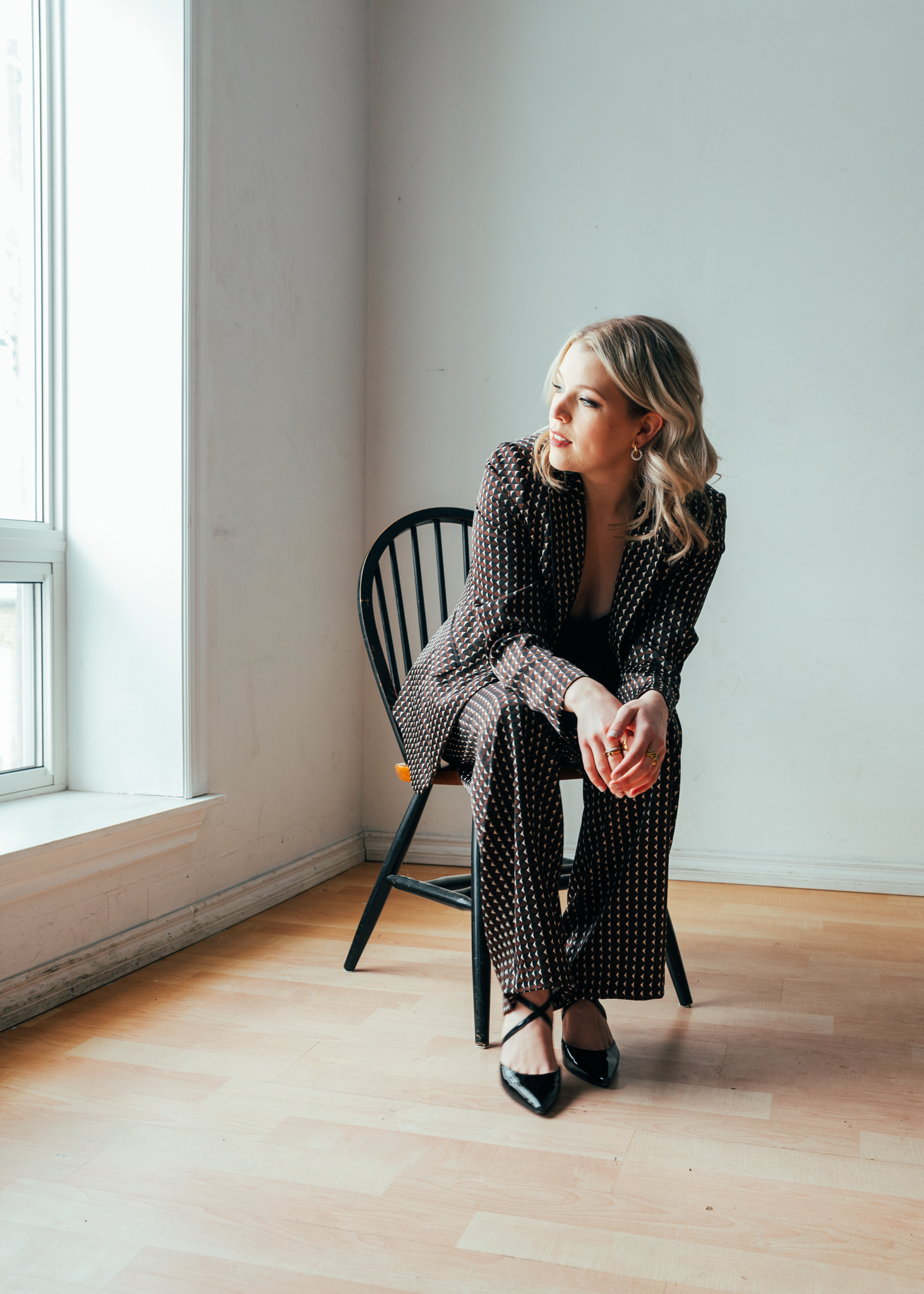
©Jim Kost Photography
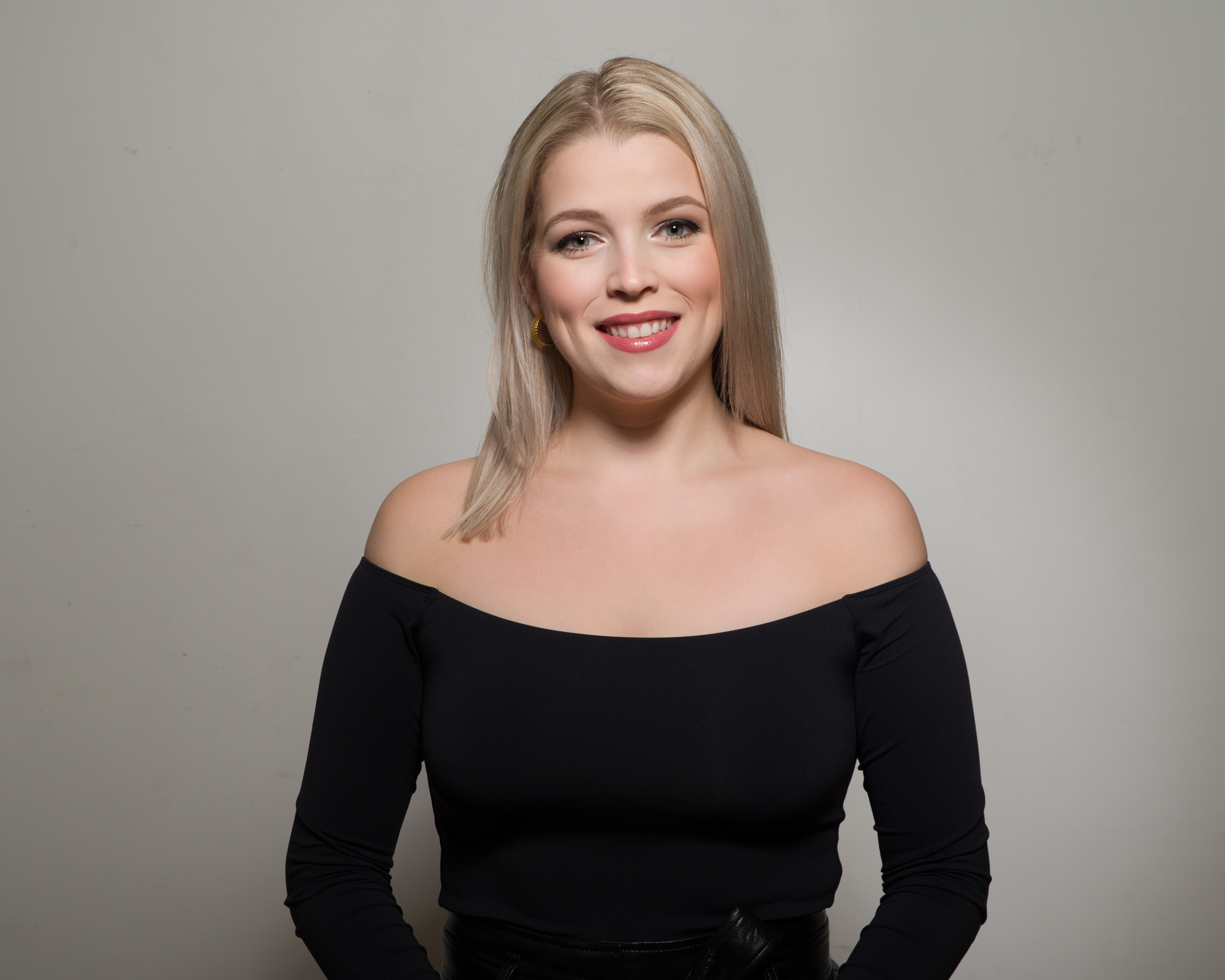
©Jim Kost Photography
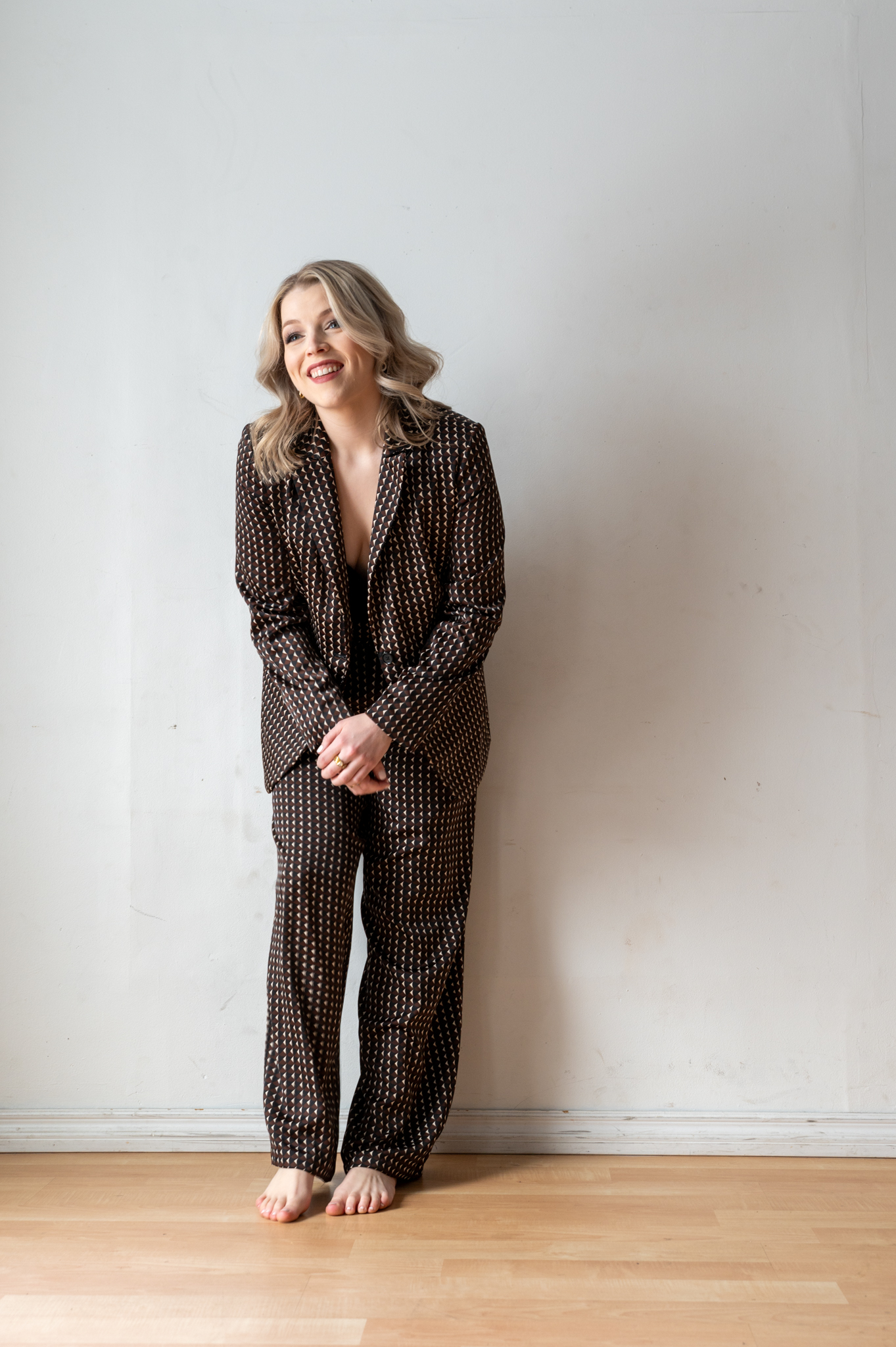
©Jim Kost Photography
Das Rheingold
Theater Erfurt
March 23 – May 29
CONDUCTOR: Pedro Halffter and Clemens Fieguth
DIRECTOR: Jurgen R Weber
WOTAN: Albert Pesendorfer
LOGE: Brett Sprague
FRICKA:Katja Bildt
FREIA: Laura Nicole Nielsen
FROH: Tristan Blanchet
DONNER: Alik Abdukayumov
ERDA: Rose Naggar- Tremblay
Alberich: Máté Sólyom-Nagy
MIME: Ewandro Stenzowski
FASOLT: Sam Taskinen
FAFNER: Kakhaber Shavidze
WOGLINDE: Candela Gotelli
WELLGUNDE: Daniela Gerstenmeyer
FLOSSHILDE: Valeria Mudra
Richard Wagner worked on his main work for around a quarter of a century: The Ring of the Nibelung . With his four full-length parts, Das Rheingold , Die Walküre , Siegfried and Götterdämmerung, he revolutionized the musical theater of his time. Wagner’s vision of performing the Ring as a whole and in his own festival hall only became a reality in Bayreuth in 1876, nine years after the Munich premiere of Rheingold .
In the first part, Das Rheingold , known as “Eve” , the foundations for the epochal human drama are laid: power and greed, love and violence are central themes in this first part of Wagner’s four-part Ring of the Nibelung . With its staff of mermaids, dwarves, giants and gods, it also seemed like a fairy tale.
The tragedy begins with the dwarf Alberich stealing the Rhine gold from the Rhinemaidens, which, when forged into a ring, grants limitless power. For this spell, however, he has to renounce love. However, Alberich cannot enjoy his newfound power for long because Wotan, the father of the gods, more or less forcibly takes the ring from him. Alberich places a curse on it that promises death to any future owner. While the gods triumphantly enter their castle of Valhalla, built by the giants, the downfall of the world of the gods has already begun.
Opera Canada depends on the generous contributions of its supporters to bring readers outstanding, in-depth coverage of opera in Canada and beyond.
Please consider subscribing or donating today.

